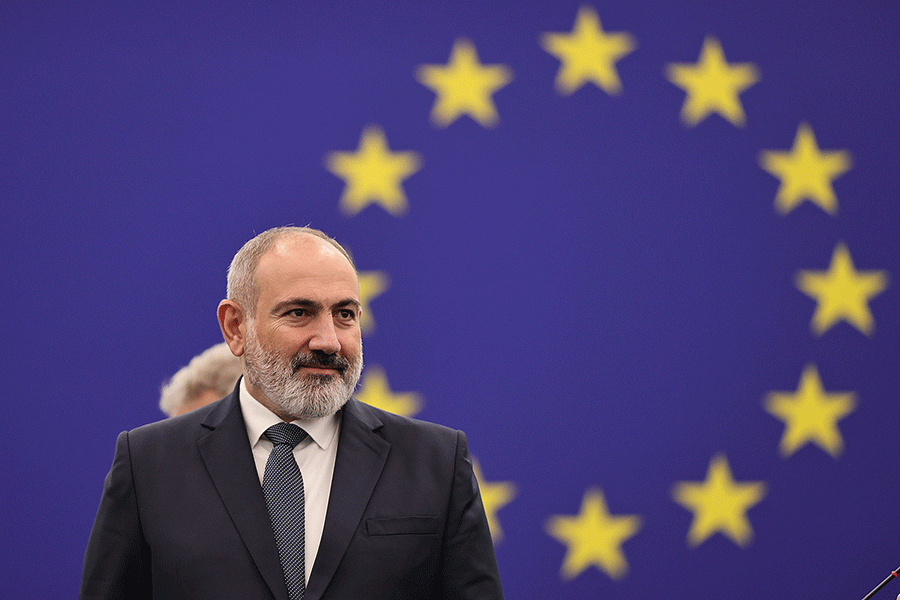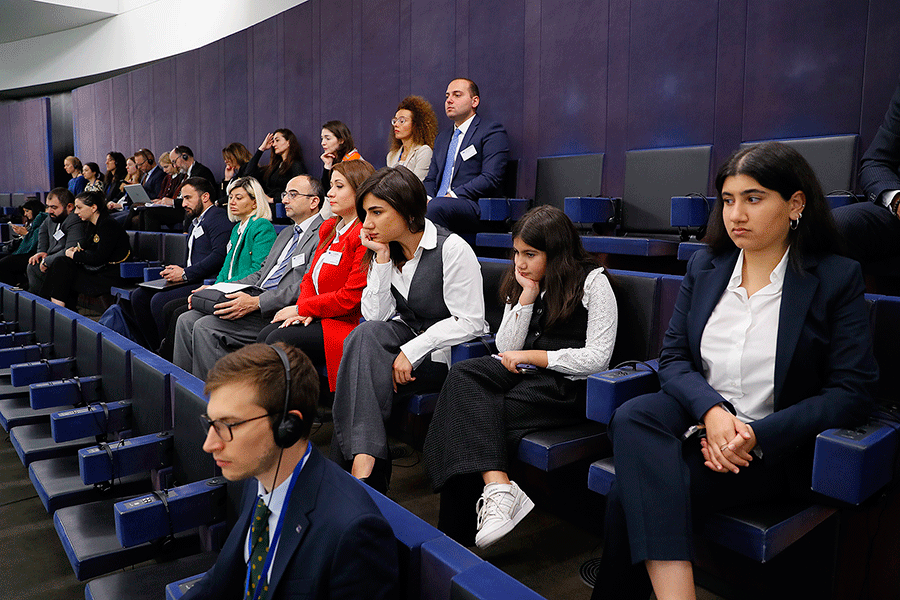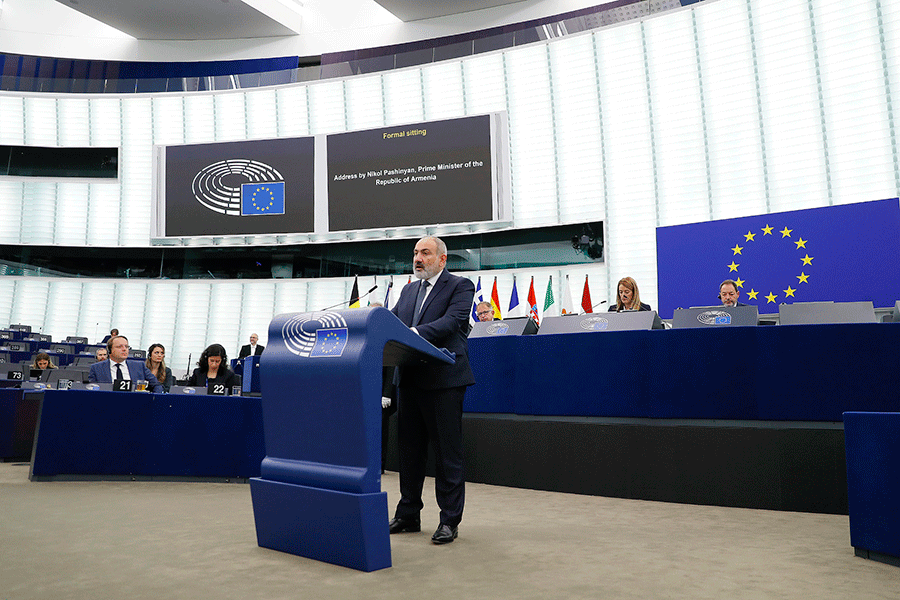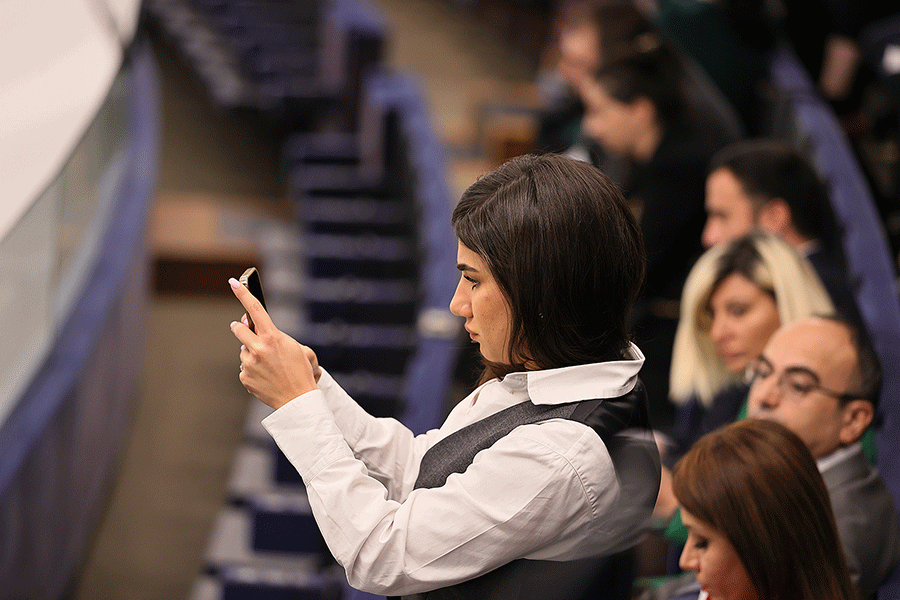Prime Minister Nikol Pashinyan’s speech at the European Parliament
Honorable President of the European Parliament, honorable members of parliament, dear attendees,
It is a great honor for me to speak from this high chair of the European Parliament and I thank you for such an opportunity. Our government and the people of the Republic of Armenia see the European Parliament as a body that spoke and speaks the language of truth during all the trials that befell the Republic of Armenia and the Armenians of Nagorno-Karabakh. I also thank you all for this, because the truth is power and every time we have had a share of that power formed by you.
Now it is common to say that democratic Armenia is going through difficult trials and this is the truth. But it is equally true that Armenia’s democracy is going through difficult trials. And yet the greatest truth is that Democracy in Armenia is going through severe trials, not only the democracy of Armenia, but democracy in general, because a series of events taking place in the Republic of Armenia and in different places of the world raise the following question: and is democracy able to provide security, peace, unity, prosperity and happiness?
Read also
But I didn’t come here to ask, I came here to answer, and my answer is an unequivocal “Yes”.
Many say that Armenia is suffering today because of democracy. But I must emphasize my belief that the Republic of Armenia would simply have been paralyzed from the largely inevitable trials that have befallen it in recent years, would have lost its independence and sovereignty, if it were not democratic.
This is evidenced by the events of 2020-2021. After the signing of the tripartite declaration of ceasefire at the end of the 44-day war, when the state institutions of Armenia became the target of attacks by extremist groups, when the society was divided and was in rage, the democratically formed institutions remained firm in their positions of statehood protection, at the same time not violating any principle of democracy. Freedom of speech and assembly was not restricted in Armenia, cases of disproportionate use of force were not recorded, and the rule of law was not belittled.
And despite the fact that we continued to have a majority in the parliament, in order to overcome the socio-psychological crisis caused by the severe consequences of the war, the ruling force, the “Civil Contract” party, made a decision to go to snap parliamentary elections, and for this purpose I resigned from the position of prime minister, and the government and the parliament were dissolved according to the established procedure.
On May 12, 2021, two days after the dissolution of the Parliament came into force de jure, Azerbaijani troops violated the border with Armenia, invading up to 4 kilometers deep into the sovereign territory of Armenia in a 100-kilometer section of the border line.
In this situation, the Collective Security Treaty Organization, which is considered the security system of Armenia, and the countries having bilateral security obligations to Armenia did not help us at all.
The purpose of this provocation, which took place before the parliamentary elections, was to thwart the upcoming parliamentary elections and paralyze the statehood of Armenia, or at least to form a puppet government. But in this environment, the people of Armenia were able to stand firm in defense of Armenia’s independence, sovereignty and democracy, and parliamentary elections were held, which were internationally recognized as free, democratic, transparent and competitive.
For the first time in the history of the Republic of Armenia, the elections became a way to overcome the internal crisis and not the other way around. This is the key difference between Armenia after and before the people’s, nonviolent, velvet revolution of 2018. If before the revolution, elections usually became the cause of internal crises due to the lack of public confidence in their results, after the revolution, elections prevent or overcome the crisis, because citizens have not only a theoretical but also a practical opportunity to make decisions and implement those decisions.
Ever since the people’s, non-violent, velvet revolution of 2018, no election at any level has been rigged in Armenia, and if 6 years ago people would have laughed at the assertions about their right to form a government through elections, now they will not understand what falsification or rigging of the election results means. This is what has changed in the Republic of Armenia in the last 5 years.
But democracy in Armenia has continued and continues to receive strong blows, which operate with an almost exactly repeated formula. external aggression, then the inaction of Armenia’s allies in the field of security, then attempts to use the war or humanitarian situation or the external security threat to subvert Armenia’s democracy and sovereignty, which is expressed by inciting internal instability with hybrid technologies directed by external forces.
We have had such situations several times since 2020, the largest of which was Azerbaijan’s large-scale attack on Armenia on September 13, 2022, which led to the occupation of Armenia’s sovereign territories.
The most recent and most tragic incidents of this kind took place very recently, when Azerbaijan, fulfilling its long-standing policy of ethnic cleansing, carried out a large-scale attack on Nagorno Karabakh. At the time when hundred of thousands of Armenians fled from Nagorno Karabakh to the Republic of Armenia, our allies in the security sector not only did not help us, but also made public calls for a change of power in Armenia, to overthrow the democratic government.
But the people of the Republic of Armenia consolidated for their own independence, sovereignty, democracy, and another conspiracy against our state failed. The government and the people of the Republic of Armenia combined efforts to solve the problem of accepting and sheltering more than 100,000 Armenians who were victims of ethnic cleansing in Nagorno-Karabakh, and I must record that we did it with dignity, so that our international partners admit that they have not seen a case when 100 thousand refugees enter a country in a week and that country can accept all of them without establishing refugee camps and tent settlements.
We were able to do it thanks to the Armenian people and democracy. People, because sometimes people didn’t even wait to see what the government would do. They were the ones who provided the forcibly displaced people with essential goods and even temporary shelters. Many simply hosted them in their homes.
Democracy, because after the revolution of 2018, all the obstacles for free economic activity and artificial monopolies in Armenia have disappeared, the transparency and accountability of the government has increased, there is an uncompromising, principled and institutional fight against corruption, the rule of law has been established, and thanks to all this, Armenia, despite the calamities and threats, continues to be in the zone of high economic growth and since 2018, the tax revenues in our country have increased by about 70 percent.
With the decisions that have already been taken and entered into force today, we are to allocate around 100 million USD to support those forcibly displaced from Nagorno Karabakh. And we need international assistance, including in the form of budgetary support. I consider it necessary to emphasize that we have created such a mechanism to support forcibly displaced people that the funds allocated to them are transferred non-cash, that is, the allocation of funds is transparent, verifiable and trackable, and the mechanism will continue to operate in this way.
And we are grateful to our international partners, the EU and the Member States, which have already made and/or will continue to make allocations aimed at overcoming the humanitarian crisis caused by the forced displacement of Nagorno Karabakh Armenians.
Honorable President of the European Parliament, honorable members of parliament, dear attendees,
It is sad, extremely sad, that despite hundreds of alarms, decisions of the International Court of Justice, resolutions of the European Parliament, PACE and the parliaments of individual countries, appeals of executive bodies, the international community, we all were unable to prevent the ethnic cleansing of Armenians in Nagorno-Karabakh.
The Government of Armenia and the European Parliament have repeatedly warned about the imminent ethnic cleansing in Nagorno-Karabakh, the Government of Armenia has sent many calls to the UN, OSCE, EU to send a fact-finding team to the illegally blocked Lachin Corridor and Nagorno-Karabakh, but no organization made a relevant decision. We initiated three discussions related to the issue in the UN Security Council, but the discussions did not have any practical results and here, Nagorno Karabakh is already depopulated. In the conditions of inactivity of the Russian peacekeeping force, more than 100 thousand Armenians left their homes and homeland in Nagorno Karabakh within a week, another 20 thousand had been forced to abandon Nagorno Karabakh immediately after the 44-day war, and a part of them had no chance to return to Nagorno Karabakh due to the illegal blocking of the Lachin Corridor, which started in December 2022.
And today some pretend that they do not understand why the Armenians of Nagorno Karabakh left their homes en masse. This is cynicism in itself, because the answer is more than clear. Azerbaijan clearly and unequivocally demonstrated its decision to make the life of Armenians in Nagorno Karabakh impossible.
Since December 2022, during the period of the illegal blockade of the Lachin Corridor, the Armenians of Nagorno-Karabakh have been deprived of external supplies of gas, electricity, fuel, food, baby food, medicine, hygienic and other essential goods, while civilians engaged in agricultural work have been targeted by the Azerbaijani armed forces.
Since December 2022, we have alerted dozens of times about Azerbaijan’s plan: close the Lachin Corridor, starve people, increase military, informational and psychological pressure, then open the Lachin Corridor, forcing all Armenians to leave.
We talked about such a scenario in January, February, March, April, May, June, July, August of 2023, we talked loudly and publicly. And I do not accept the surprised faces of some international officials over the depopulation of Nagorno Karabakh that took place in September. At the same time, I must thank the European Parliament for naming what happened in Nagorno-Karabakh by its name. This is important in terms of protecting the future rights of people who have been deprived of their motherland.
Honorable President of the European Parliament, honorable members of parliament, dear attendees,
Despite all wars, complications, crises, I have come to the European Parliament with the following main message. Our region, the South Caucasus, needs peace, that is, a state where all the countries of the region live with open borders, are connected by active economic, political, cultural ties, with accumulated experience and tradition of solving all issues diplomatically and through dialogue. I want to particularly emphasize that we do not oppose our ideas about peace to the interests of our region in any way, because our country can be peaceful if the region is peaceful. And I consider supporting peace building as my main political commitment.
It is not easy to undertake such a commitment, considering the long-standing conflict with Azerbaijan, numerous victims, missing people, prisoners, suffering and despair.
But is peace possible and if so, how? At the beginning of October, before the Granada meeting of the European Political Community, we had a serious opportunity to make a breakthrough in the peace process, but the President of Azerbaijan, unfortunately, refused to come to the meeting of the European Political Community and to accept a joint statement with the President of the European Council, the President of France, the German Chancellor, and me, which should express the principles of establishing peace and relations between Armenia and Azerbaijan. Those principles and content are not new at all and were formed based on the results of the quadrilateral meeting held in Prague on October 6, 2022, in which the President of France, the President of the European Council, the President of Azerbaijan and I participated.
Those principles were further concretized in 2023, during the Brussels meetings between the President of the European Council, the President of Azerbaijan and myself, and there are public statements about those principles.
The first of the principles is expressed in the Quadripartite Declaration of Granada as follows. I quote: “They remain committed to all efforts directed towards the normalization of relations between Armenia and Azerbaijan, based on mutual recognition of sovereignty, inviolability of borders and territorial integrity of Armenia (29.800 km2) and Azerbaijan (86.600 km2), as mentioned in President Michel’s statements of 14 May and 15 July 2023. They called for the strict adherence to the principle of non-use of force and threat of use of force.” End of quote.
This same principle is expressed as follows in the statement of European Council President Charles Michel following the tripartite meeting held in Brussels on May 14 with the participation of the President of the European Council, the President of Azerbaijan and myself. I quote. “The leaders (It’s about the Azerbaijani president and myself) confirmed their unequivocal commitment to the 1991 Almaty Declaration and the respective territorial integrity of Armenia (29,800 km2) and Azerbaijan (86,600 km2)”. End of quote.
Dear attendees, what you need to know additionally on this issue is the following. Following these agreements, I reaffirmed several times that the Republic of Armenia recognizes the territorial integrity of 86 thousand 600 square kilometers of Azerbaijan, but the President of Azerbaijan never made such a statement. Recently, he announced that he recognizes the territorial integrity of Armenia, but did not mention 29 thousand 800, which raises concerns that he is deliberately leaving ambiguities to bring forward territorial claims against Armenia. The agreement to recognize the territorial integrity with exact numbers was reached precisely so that neither Armenia nor Azerbaijan would leave ambiguities when recognizing each other’s territorial integrity, for example saying that a part of the territory of the given country does not actually belong to it.
The next principle of peace and normalization of relations between Armenia and Azerbaijan is expressed in the Granada Declaration as follows. I quote: “They stressed the urgent need to work towards border delimitation based on the most recent USSR General Staff maps that have been provided to the sides, which should also be a basis for distancing of forces, and for finalizing the peace treaty and addressing all humanitarian issues.” End of quote.
This principle was expressed by European Council President Charles Michel in his statement following the tripartite meeting held in Brussels on July 15 with the participation of the President of the European Council, the President of Azerbaijan and myself. I quote: ” Both leaders (It’s again about the Azerbaijani president and myself) reconfirmed their unequivocal commitment to the 1991 Almaty Declaration as a political framework for the delimitation. ” End of quote.
This same principle was recorded based on the results of the quadrilateral meeting in Prague on October 6, 2022 as follows. I quote: “”Armenia and Azerbaijan confirmed their commitment to the UN Charter and 1991 Alma-Ata Declaration, through which both sides recognize each other’s territorial integrity and sovereignty. They confirmed that this will form the basis for the work of the commissions on delimitation.” End of quote.
You should know the following additional information about this principle. The Almaty Declaration was signed by the 12 republics of the Soviet Union on December 21, 1991. That declaration made the following two important records in the context of the issue being discussed.
1. The Soviet Union ceases to exist.
2. The republics recognize each other’s territorial integrity, sovereignty, the inviolability of existing, that is, administrative borders, and therefore the existing administrative borders between the Soviet Republics become state borders.
Azerbaijan declares that there is no border between Armenia and Azerbaijan, which contradicts the Almaty declaration and the above-mentioned agreements. Azerbaijan also maintains ambiguities in accepting the latest maps of the Soviet Union as a basis for delimitation, which also gives some experts a reason to assume that Azerbaijan is preparing grounds for making territorial claims against Armenia and initiating a new military aggression.
The next principle of peace and normalization of relations between Armenia and Azerbaijan is expressed in the Granada Declaration as follows. I quote: “They called for greater regional cooperation and for the re-opening of all borders, including the border between Armenia and Türkiye, as well as for the opening of regional connectivity links based on full respect of countries’ sovereignty and jurisdiction, as well as on the principles of equality and reciprocity.” End of quote.
This principle was expressed by European Council President Charles Michel in his statement following the tripartite meeting held in Brussels on July 15 this year with the participation of the President of the European Council, the President of Azerbaijan and myself. I quote: “We (that is, the President of the European Council, the President of Azerbaijan and I) discussed modalities of future transport arrangements which will respect the principles of sovereignty, jurisdiction and reciprocity.” End of quote.
You need to know the following additional information about this principle. Azerbaijan continuously insists that Armenia is obliged to give Azerbaijan a corridor through its own territory. In everyday international parlance that you are familiar with, the word corridor simply means interstate roads. But there is a peculiarity in the case of our region. In the tripartite statement of November 9, 2020, the word “corridor” is used only for the Lachin Corridor, which was supposed to connect Nagorno-Karabakh and Armenia. The peculiarity is that according to that document, the Lachin Corridor is not just a road, but also a 5-kilometer-wide territory, which should have been outside the control of Azerbaijan, under the control of peacekeepers. Therefore, in this context, the word corridor has the meaning of an extraterritorial layer.
The Republic of Armenia has never, anywhere, agreed to any limitation of its sovereignty and jurisdiction over any of its territories, has not made such a promise. Therefore, what does the principle quoted above mean?
It means one simple thing. On the basis of their sovereignty and jurisdiction, Armenia and Azerbaijan should open their roads for each other without the above-mentioned corridor logic. At the checkpoints of those roads, border and other relevant control services should operate, based on the jurisdiction, sovereignty, and legislation of the countries. This should be done based on the principle of reciprocity and equality, and we are ready to go for such solutions, we are ready to restore the Meghri railway, which will connect not only Azerbaijan and Armenia, but also the southern regions of Armenia with the northwestern regions, the southwestern regions of Azerbaijan with the Autonomous Republic of Nakhichevan, with its further continuation it will link Armenia with Turkey, Azerbaijan with Turkey, Georgia, Azerbaijan, Armenia with the Islamic Republic of Iran, East with the West, stretching from the Caspian Sea to the Mediterranean, North with South, from the Gulf to the Black Sea. In Armenia, we call this project the Armenian Crossroads. But I think it’s time to further regionalize this project, rebrand it, and call it Crossroads of Peace, and this name is equally important and acceptable for us. In the same logic, we are ready for the opening of roads as well. The Republic of Armenia is ready to ensure the safety of cargo, vehicles, people, pipelines, electric lines in its territory, because the Crossroads of Peace implies the passage of pipelines and power lines as well.
This kind of solutions are also very important for the Republic of Armenia, because our country has been under blockade by Azerbaijan and Turkey for 30 years.
As you can see, there is no reason to accuse Armenia of obstructing the opening of transport communications in the region, but there are analyzes that official Baku is manipulating the narrative of corridor to provoke a new war in the region, to occupy new territories of Armenia, or to keep Armenia under blockade.
This should not be allowed. As you saw, all the principles mentioned above were developed and agreed upon with the participation of the President of the European Council and the President of Azerbaijan, and we are ready to implement these agreements. Moreover, in terms of transport communications, by observing the above-mentioned principles, including the principle of reciprocity, we are ready to facilitate procedures, we are ready to ensure the safety of the passage of Azerbaijani goods and Azerbaijanis through our territory, hoping for reciprocity as well, we are ready for a simultaneous withdrawal of troops from the 1991 border line, which will mean that Azerbaijan will not have troops in any territory of Armenia, and Armenia will not have troops in Azerbaijan. We are ready to address the issue of the so-called enclaves on the principle of reciprocity, as I stated in the interview given to the Armenian Public TV on October 10.
And finally, we are ready to sign a peace treaty with Azerbaijan by the end of the year. Of course, the fact that Azerbaijan refused to come to the Granada meeting, on which, by the way, the agreement had been reached on July 15 in Brussels and this agreement is also expressed in the statement issued by Charles Michel based on the results of the meeting, so not coming to that meeting did not make our affairs easier.
But on the other hand, during this year, as mentioned by the President of the European Parliament, we have an agreement to hold a tripartite meeting in Brussels, and if the above-mentioned principles are officially reaffirmed, signing an agreement on peace and normalization of relations between Armenia and Azerbaijan by the end of the year will become very realistic.
We are also ready for releasing all prisoners, captives and detained persons, in the principle “all for all”, and we are also ready to cooperate closely in clarifying the fate of the missing persons. 1016 citizens of Armenia are currently considered missing. We are ready to cooperate in demining. I would like to specially emphasize that still in 2021, Armenia received from Nagorno Karabakh and transferred to Azerbaijan all the maps of minefields at the disposal of the Armenian side. We did this without preconditions, as an expression of goodwill, but, unfortunately, Azerbaijan perceived it not as a step towards peace, but as an opportunity to intensify aggressive rhetoric towards Armenia.
But in spite of all this, we must move steadily towards peace.
To do this, political will is necessary and I and the Armenian government, the parliamentary majority have that political will. On the other hand, the international community and the European Union, the countries of our region should support us, do everything to make the taking of this opportunity a reality for us, for Azerbaijan and Armenia. And in this matter, I have to ask for your continued attention and support, especially in the implementation of the principles on which, as I have already said, we have reached an agreement with the participation of the President of the European Council, Charles Michel, and the President of Azerbaijan.
Honorable President of the European Parliament, honorable members of parliament, dear attendees,
Referring to the EU-Armenia bilateral relations, I must emphasize that the EU is the key partner supporting the fundamental reforms of the Armenian government in recent years. In this context, I consider it necessary to emphasize the importance of the Comprehensive and Enhanced Partnership Agreement, which is one of the pillars of our reform agenda and is in the stage of active implementation.
Since February of this year, the long-term civilian mission of the European Union has been operating in Armenia, which monitors the security situation along the state border of Armenia with Azerbaijan. This is a key event through which the European Union got involved in Armenia’s security agenda for the first time, the foundation of which was laid during the quadrilateral meeting in Prague on October 6, 2022.
Among the reforms aimed at strengthening democracy, with the support of the EU, we are implementing police reforms and this month, in just two weeks, we will complete the establishment of a completely new patrol police in Armenia. We expect the continuation of cooperation in the reforms of police and rescue service, independent judicial system, education and public administration.
The agenda of our relations with the European Union is actually very extensive. It is extremely important to give new momentum and volume to the programs implemented under the EU Economic and Investment Plan, the important goals of which are stable and balanced economic development, infrastructure modernization, digitalization and technological development, as well as increasing the resilience of the southern regions of Armenia. The latter is particularly important in the context of both the country’s continuous development and the establishment of sustainable peace in the region. Within the framework of the Plan, projects worth more than 400 million euros have already been launched, implemented with various financial instruments, of which around 270 million euros are for access of SME to finance, around 34 million euros are for technological development, around 43 million euros are for increasing the resilience of Syunik, and around 62 million euros are for the green development of Yerevan.
I am happy to emphasize that this is not all. On October 5 of this year, two extremely important documents for EU-Armenia relations were adopted in Granada. One of them is the quadrilateral statement of President Michel, President Macron, Chancellor Scholz and myself, the other is the bilateral statement of President von der Leyen and myself.
Both statements support the strengthening of EU-Armenia relations in all dimensions based on the needs of the Republic of Armenia. We are committed to further strengthen EU-Armenia relations. In the long term, the European Union and Armenia are determined to strengthen their economic ties by working to unlock the full potential of the Comprehensive and Enhanced Partnership Agreement.
Based on all this, dear attendees, I can clearly and confidently state. The Republic of Armenia is ready to be closer to the European Union, as much as the European Union considers it possible. Our joint statement with President von der Leyen reads: “In these difficult times, the EU and Armenia stand shoulder to shoulder.”
Let us continue to stand shoulder to shoulder in our commitment to make the times better. As I said, I am convinced that democracy can provide peace, security, unity, prosperity and happiness. Let’s prove this together. Long live democracy! Thank you.
INFORMATION AND PUBLIC RELATIONS DEPARTMENT OF THE OFFICE OF THE PRIME MINISTER OF THE REPUBLIC OF ARMENIA





























































